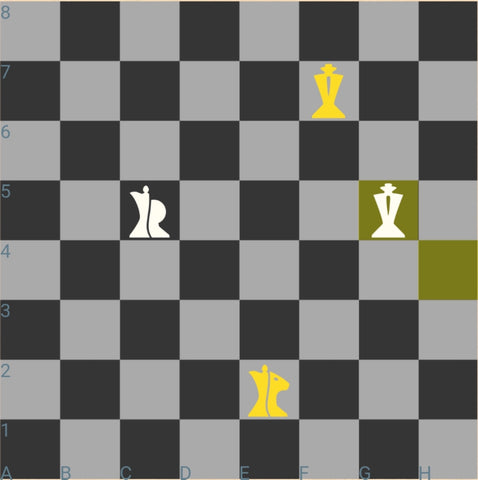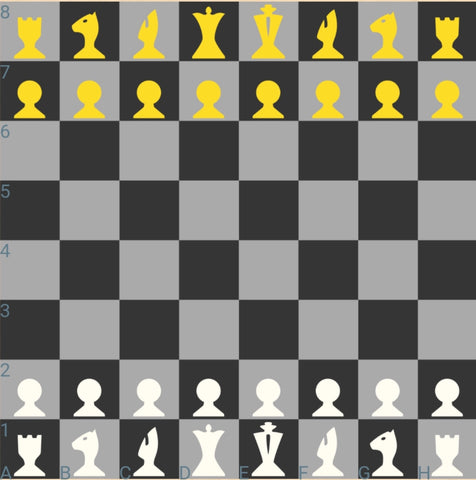Notation - The Language of Chessplus
(With thanks to Greg Wilson Newcastle CC and Dr Mark Wood Drwood.com.au)
Chessplus notation is a convenient way to keep track of games, so that you can replay them to study tactics, understand mistakes, or impress friends. Try out Chessplus notation in your next game - to review your game, improve your play and enjoy the wins that much more.
Chessplus notation is called Algebraic Notation. It labels the grid of the Chessplus board with letters and numbers.

In this diagram, the white Quawn (Queen+Pawn) is on square c5 and the gold Quight (Queen+Knight) is on square e2. The white King is on square f7 and the gold king is on square g5.
Rank (or row) 1 is the end of the board where white begins; black begins at rank 8. The files (or columns) are lettered from white's left to right.
Additionally, capital letters are used for individual pieces, merged pieces and the act of merging as follows:
K: King
Q: Queen, QB (Queen+Bishop), QN (Queen+Knight), QR (Queen+Rook), QP (Queen+Pawn), QQ (Queen+Queen)
B: Bishop, BN (Bishop+Knight), BR (Bishop+Rook), BP (Bishop+Pawn), BB(Bishop+Bishop)
N: Knight, NR (Knight+Rook), NP (Knight+Pawn), NN (Knight+Knight)
R: Rook, RP (Rook+Pawn), RR (Rook+Rook)
P: Pawn (by convention, P is usually omitted from notation when using individual Pawns)
M: Merge
How to Write a Move
To write a move, give the name of the piece and the square to which it moves. If a piece is captured, we include the symbol x for "captures" before the destination square.

For example, in this game, white's first move is Bb2M: bishop to b2 merge. Gold responds with h6: pawn to h6. White plays Nc3 and gold does d6. Next white Bc3M. Gold responds with BPe6: the merged bishop pawn to e6. White does Qd2M. The rest of the game is written as
... Qd6M
Qxh6 (Queen captures h6) Nxh6 (Knight captures Queen)
BNxg7+ Kd8
BNf6#
+ is the sign for check, and # is the sign for checkmate.
x: captures
0-0: kingside castle
0-0-0: queenside castle
+: check
#: checkmate
!: good move
?: poor move
more !s and ?s can be added for emphasis.

QNxd2 is not enough to define this move--which QN ?
In situations where regular notation is ambiguous, add an extra letter or number to specify the origin of the piece that moves. Here, QNbxd2, QN from file b to square d2, solves the problem. When a pawn makes a capture, always include the originating file, e.g dxe4 or gxe4.
